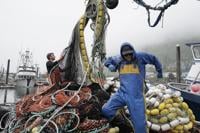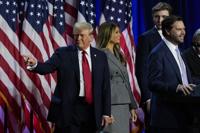COLUMBUS, Ohio (AP) — Two former top executives of FirstEnergy Corp. were indicted Monday in a $60 million bribery scheme in Ohio related to a legislative bailout for two Ohio nuclear power plants that has already resulted in a 20-year prison sentence for a former state House speaker.
Ohio Attorney General Dave Yost announced in an online news conference that former FirstEnergy CEO Chuck Jones and Senior Vice President Michael Dowling were charged in relation to their role in the massive corruption case. They were fired in October 2020 for violating company policies and code of conduct.
After a Summit County grand jury indicted Jones and Dowling on Friday, Yost said, the two men promised to turn themselves in Monday to the Summit County Jail. They did not keep that promise, and Yost said he anticipates the they will be taken into custody sometime later Monday.
Sam Randazzo, former chair of the Public Utilities Commission of Ohio, is centered around allegations that he accepted bribes from Akron-based FirstEnergy Corp. in exchange for regulatory favors. He resigned in November 2020 after FBI agents searched his Columbus townhome and FirstEnergy revealed in security filings that it had paid him $4.3 million for his future help at the commission a month before Republican Gov. Mike DeWine nominated him as Ohio’s top utility regulator.
The state has charged Jones, Dowling and Randazzo with a combined total of 27 counts of criminal charges in relation to the massive corruption case, including bribery, theft, engaging in corrupt activity, tampering with records and money laundering.
“This indictment is about more than one piece of legislation,” Yost said in an online news conference Monday. “It is about the hostile capture of a significant portion of Ohio’s state government by deception, betrayal and dishonesty.”
The long-awaited indictments mark the latest development in what has been labeled the largest corruption case in Ohio history.
Former Ohio House Speaker Larry Householder in prison for his role in orchestrating the scheme, and lobbyist Matt Borges, a former chair of the Ohio Republican Party, was .
The U.S. attorney’s office in Cincinnati indicted on racketeering charges in July 2020. Lobbyist Juan Cespedes and Jeffrey Longstreth, a top Householder political strategist, pleaded guilty in October 2020 and await sentencing. The third person arrested, statehouse lobbyist Neil Clark, pleaded not guilty before . The dark money group used to funnel FirstEnergy money, Generation Now, also to a racketeering charge in February 2021.
All were accused of using the $60 million in secretly funded FirstEnergy cash to get Householder’s chosen Republican candidates elected to the House in 2018 and then to help him get elected speaker in January 2019. The money was then used to win passage of the tainted energy bill, House Bill 6, and to conduct what authorities have said was a $38 million dirty-tricks campaign to prevent a repeal referendum from reaching the ballot.
In July 2021, Yost asked a judge in Columbus to add Jones, Dowling and Randazzo to a lawsuit by his office against FirstEnergy.
An 81-page FBI criminal complaint from July 2020 detailed how executives of Akron-based FirstEnergy interacted with Householder and others indicted in the scheme, including 84 phone contacts between Jones and the former speaker and 14 phone contacts between Dowling and Householder.
FirstEnergy admitted to its role in the bribery scheme as part of a July 2021 with the U.S. Department of Justice. The company agreed to pay $230 million in penalties and to accomplish a long list of reforms within three years in order to avoid being criminally prosecuted on a federal conspiracy charge.
A statement of facts signed by current FirstEnergy CEO and President Steven Strah lays out in detail the involvement of Jones, Dowling, Randazzo and others in the bribery scheme. Randazzo’s attorneys have called claims contained in the document mere “hearsay” designed to keep the energy giant out of legal hot water.








































